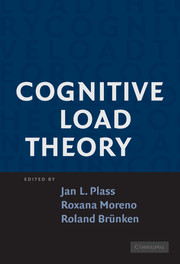Book contents
- Frontmatter
- Contents
- Contributors
- COGNITIVE LOAD THEORY
- Introduction
- PART ONE THEORY
- 1 Cognitive Load Theory: Historical Development and Relation to Other Theories
- 2 Cognitive Load Theory: Recent Theoretical Advances
- 3 Schema Acquisition and Sources of Cognitive Load
- 4 Individual Differences and Cognitive Load Theory
- PART TWO EMPIRICAL EVIDENCE
- PART THREE DISCUSSION
- Index
- References
3 - Schema Acquisition and Sources of Cognitive Load
Published online by Cambridge University Press: 05 June 2012
- Frontmatter
- Contents
- Contributors
- COGNITIVE LOAD THEORY
- Introduction
- PART ONE THEORY
- 1 Cognitive Load Theory: Historical Development and Relation to Other Theories
- 2 Cognitive Load Theory: Recent Theoretical Advances
- 3 Schema Acquisition and Sources of Cognitive Load
- 4 Individual Differences and Cognitive Load Theory
- PART TWO EMPIRICAL EVIDENCE
- PART THREE DISCUSSION
- Index
- References
Summary
INTRODUCTION
The previous chapter outlined the general features of human cognitive architecture relevant to learning. According to this architecture, our schematic knowledge base in long-term memory represents the major critical factor influencing the way we learn new information. In the absence of a relevant knowledge base for a specific situation or task, we apply random search processes to select appropriate actions. Any modifications to our knowledge base for dealing with novel situations occur only under certain restrictive conditions on the amount of such change. Based on these general characteristics of learning within a cognitive load framework, it is possible to formulate general instructional principles that support processes of schema acquisition and enable understanding and learning. This chapter suggests a number of such Cognitive Load Theory (CLT)–generated principles for efficient instruction aimed at acquisition of an organized knowledge base: a direct initial instruction principle, an expertise principle, and a small step-size of change principle. To substantiate these principles, it is necessary first to describe in more detail the concept of schematic knowledge structures and analyze sources of cognitive load that are irrelevant to learning processes.
LEARNING AS SCHEMA ACQUISITION
Schemas represent knowledge as stable patterns of relationships between elements describing some classes of structures that are abstracted from specific instances and used to categorize such instances. Multiple schemas can be linked together and organized into hierarchical structures.
Information
- Type
- Chapter
- Information
- Cognitive Load Theory , pp. 48 - 64Publisher: Cambridge University PressPrint publication year: 2010
References
Accessibility standard: Unknown
Why this information is here
This section outlines the accessibility features of this content - including support for screen readers, full keyboard navigation and high-contrast display options. This may not be relevant for you.Accessibility Information
- 49
- Cited by
